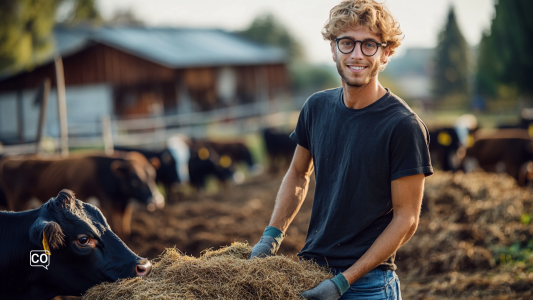Spanish A2.9.1 A day on the farm with Pedro and Ana Share Copied!
Pedro and Ana are at the farm feeding the animals. Practice farm animal vocabulary with this easy dialogue in Spanish.
Diálogo: Un día en la granja con Pedro y Ana
Pedro y Ana están en la granja alimentando a los animales. Practica vocabulario sobre animales de la granja con este diálogo fácil en español.

A2 Spanish
Level: A2
Module 2: Naturaleza y medio ambiente (Nature and environment)
Lesson 9: Visita el campo (Visit the countryside)
Teaching guidelines +/- 15 minutes
Audio and video
Conversation
| 1. | Pedro: | ¿Puedes ayudarme a alimentar a los animales? | (Can you help me feed the animals?) |
| 2. | Ana: | ¡Claro! ¿Qué hago primero? | (Of course! What do I do first?) |
| 3. | Pedro: | ¿Por qué no empezar con las vacas? | (Why not start with the cows?) |
| 4. | Ana: | Vale, ¿y después cuido al toro? | (Okay, and then do I take care of the bull?) |
| 5. | Pedro: | Yo lo alimento después porque está en el campo. | (I will feed him later because he is in the field.) |
| 6. | Ana: | Entonces les doy comida al gallo y a las gallinas ahora. | (Then I feed the rooster and the hens now.) |
| 7. | Pedro: | Bien. También puedes dar agua a las cabras. | (Good. You can also give water to the goats.) |
| 8. | Ana: | Vale, lo hago. ¿Por qué no les das comida a los patos? | (Okay, I'll do it. Why don't you give some food to the ducks?) |
| 9. | Pedro: | Porque ya los he alimentado esta mañana. | (Because I have already fed them this morning.) |
| 10. | Ana: | ¡Perfecto! Voy a ver cómo están los cerdos. | ("Perfect! I am going to see how the pigs are doing.") |
| 11. | Pedro: | Y la oveja también necesita comida porque tiene hambre. | (And the sheep also needs food because it is hungry.) |
| 12. | Ana: | Vale. Luego voy a correr con los caballos pequeños. | (Okay. Then I am going to run with the horses.) |
| 13. | Pedro: | Gracias por tu ayuda en la granja. | (Thank you for your help on the farm.) |
